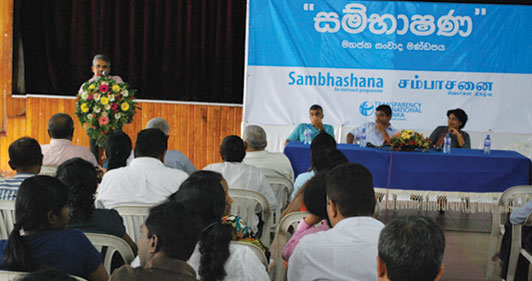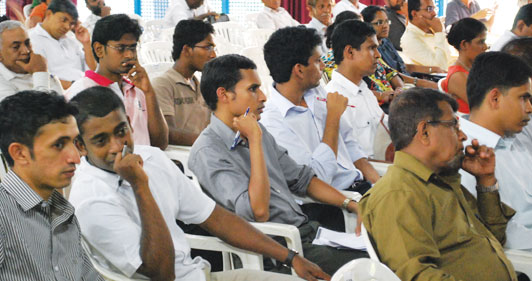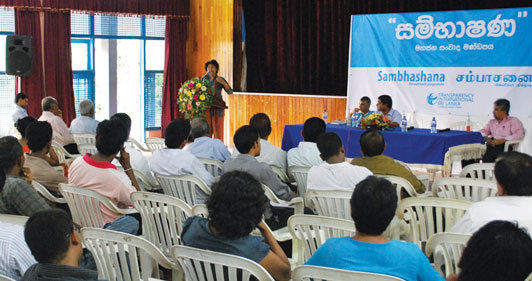“Today local government elections are fought just like a major election. Political parties enter the fray and large amounts of money are spent. Elections are a big business today.
“Sri Lanka’s local elections have had a cherished history. Prior to 1977 when the village committee system was in operation, the accepted leaders in the village got elected. They went about electioneering on bicycles. The villagers called them ‘aiya’, ‘maama’.
“If we are to do a meaningful change in local administration, we must have a new constitution based on the fundamentals which were in operation in the pre-1970’s era.”
These views were expressed by Dr Sumansiri Liyanage, Associate Professor in Economics – Peradeniya University at the ‘Sambhasahana’ Outreach Programme on ‘People’s participation in Local Governance’ organised by TISL and held at the Public Library Auditorium on 29 September.
Presentations were also made by Dr Tudor Weerasinghe, Head of Sri Palee Campus – Colombo University and Ms Shanthi Satchichananda. The moderator was Attorney-at-Law, Jagath Liyanarachchi.
In his welcome address, TISL Chairman M D A Harold said that the ‘Sambhashana’ programme provides an opportunity for public discussion on topical issues.
 Continuing, Dr Liyanage said that although good governance and transparency introduced after the seventies decade under the new liberal economic system had certain cheap values it is not possible to build up a real liberal society without changing the structures and the electoral system in the 1978 Constitution.
Continuing, Dr Liyanage said that although good governance and transparency introduced after the seventies decade under the new liberal economic system had certain cheap values it is not possible to build up a real liberal society without changing the structures and the electoral system in the 1978 Constitution.
Quoting an example of how local government election campaigns are conducted today, he pointed out that he saw on TV a candidate claiming how he had given 500 million rupees to a party leader for one election and another 1000 million for the next election. “I thought he was mentioning lakhs and not millions. But the sums referred to were millions. I like to know whether the Inland Revenue Department officials visited this person to find out how he got so much of money and how the other person spent such a lot of money. No one queries these. Has the Bribery Commission taken action? This shows that this is not a big issue. That is because it is part and parcel of the system,” he said.
Referring to the claim made by PAFFREL that a candidate spends a million a day on the election, which amounts to 30 million for 30 days, he said that this shows that without spending such huge amounts, one cannot win an election. “In such a backdrop, it is a grave mistake for someone to say that a real liberal society can be built without changing the structure, the constitution and the political party system now in operation.”
 “The government says that since they are in power, there should not be a change. This is totally contradictory to the fundamental rights of an individual,” he stressed.
“The government says that since they are in power, there should not be a change. This is totally contradictory to the fundamental rights of an individual,” he stressed.
Dr Tudor Weerasinghe observed that in the context of a global system there is no room for a national state. We have to accept this.
He pointed out that although local governance is a subject very close to the masses, the interest shown by the media is not adequate. “There is no room for the public to discuss their problems though the media. The media should create a platform for the public in the provinces to discuss socio economic issues relevant to them. That is how there can be active participation by the masses in local governance.”
Citing local government institutions as the avenues open for right to information at least at a restricted level, he said that there is provision in the local government legislation for the public to participate at meetings of the local authorities, obtain copies of the proceedings, get copies of statements of revenue and expenditure and any information relating to projects undertaken by the local authority. “The local authority is bound by law to give such copies demanded by the public. However, unfortunately, the majority do not know the existence of such facilities,” he said.
He lamented that the media do not take an interest in enlightening the public of their rights.
VILINDU head and social activist Ms Shanthi Satchichanandan said that what is discussed today at the local government election platforms are not issues pertaining to provincial issues but national issues.
She quoted the example of how at a few public discussions held in the East to discuss issues affecting the public, they raised issues on corruption, fraud and lack of transparency. “The local authorities do not have large capital. But there is fraud even in the limited resources available. In certain places, 15% commission has to be paid to get a tender. There are other places where the local authority representatives themselves get the tenders. The public has no opportunity to raise their voice against these. They keep distancing themselves from these institutions,” she pointed out.
 ‘Sambhashana’ programme was attended by civil society representatives, media personnel, trade union activists and others.
‘Sambhashana’ programme was attended by civil society representatives, media personnel, trade union activists and others.

